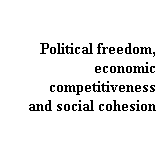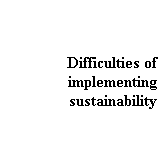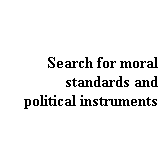 |






|
 |
 |
IV. New Responsibility: Organising Sustainability
 Transnational
networking, technological advance, and the conflict potential of a shrinking
world are setting the stage for reconceiving the idea of sustainability.
Agenda 21 from the 1992 Rio de Janeiro Earth Summit anchored the concept
of sustainability as a controlling principle in the international community.
The Agenda 21 platform formulated action commissions to secure sustainable
use of natural resources. Ecological aspects were to be integrated into
all political areas. Transnational
networking, technological advance, and the conflict potential of a shrinking
world are setting the stage for reconceiving the idea of sustainability.
Agenda 21 from the 1992 Rio de Janeiro Earth Summit anchored the concept
of sustainability as a controlling principle in the international community.
The Agenda 21 platform formulated action commissions to secure sustainable
use of natural resources. Ecological aspects were to be integrated into
all political areas.
However, narrowing the term to only its economic and ecological dimensions
is inadequate for the future. Sustainable development also requires fixing
lasting societal structures that are prepared for the future, as well
as the development of sustainable regulatory instruments in politics.
 To
think of sustainability only as a goal would be just as inaccurate; it
is much more a quality criterion for assessing the models of order and
strategies of future societies with respect to three fundamental parameters
of political and societal affairs: political freedom, economic competitiveness,
and social cohesion. To date, the assessment of these three goals has
been carried out differently. In the USA, political freedom and economic
prosperity are in the foreground. Societies in Europe turn their gaze
more towards social unity and political freedom and neglect economic competitiveness.
Asian countries have tended to emphasize economic growth and social cohesion,
at the relative cost of political freedom. To
think of sustainability only as a goal would be just as inaccurate; it
is much more a quality criterion for assessing the models of order and
strategies of future societies with respect to three fundamental parameters
of political and societal affairs: political freedom, economic competitiveness,
and social cohesion. To date, the assessment of these three goals has
been carried out differently. In the USA, political freedom and economic
prosperity are in the foreground. Societies in Europe turn their gaze
more towards social unity and political freedom and neglect economic competitiveness.
Asian countries have tended to emphasize economic growth and social cohesion,
at the relative cost of political freedom.
Technical, economic, social, and cultural changes are affecting the results
of these achievements and confronting all societies with growing conflicts
among goals. The models of order of the past, nation-state and national
economy, no longer provide sufficient answers to the question: in which
political system, and with what instruments, can a society balance these
goals? The national economy does not take into consideration the production
factor of the environment; nor does the concept of nation-state impart
sensible insights into which type of politics is suitable for the problems
of future societies in order to fulfil desired and accepted developments.
 Contrary
to the Agenda 21 targets, the planning and application of sustainability
have their defects. On one hand, they are based on the responsible actors'
differing perceptions; on the other hand, on the contextual reference
to durable politics. There can hardly be globally connected sustainability
conditions, because those conditions are dependent on time, situation,
culture, and knowledge. Differing views exist on just how to apply them.
Because the term sustainability has been used normatively from the beginning,
a standard definition is practically impossible and the concept of sustainability,
as well as the programme and discourse, become like a vague cipher, a
process for changing societies that can approach the model via stipulations
or legal regulations, as well as by voluntary processes. Contrary
to the Agenda 21 targets, the planning and application of sustainability
have their defects. On one hand, they are based on the responsible actors'
differing perceptions; on the other hand, on the contextual reference
to durable politics. There can hardly be globally connected sustainability
conditions, because those conditions are dependent on time, situation,
culture, and knowledge. Differing views exist on just how to apply them.
Because the term sustainability has been used normatively from the beginning,
a standard definition is practically impossible and the concept of sustainability,
as well as the programme and discourse, become like a vague cipher, a
process for changing societies that can approach the model via stipulations
or legal regulations, as well as by voluntary processes.
The deficient application of sustainable solutions may result from the
inaccuracy of differing definitions or operationalisations. It is more
important to recall, however, that the neo-classic economic model knows
neither nature's nor society's barriers. Economical conduct aims at the
maximising of economic returns and ignores the biospheres and sociospheres
as cost factors. The economic system does not necessarily produce individual
or collective behaviour that enforces the protection of natural and societal
living spaces. With that, the following question becomes fundamental:
how can individual or group behaviour overcome generational barriers and
change in favour of balanced economic, social, ecological and cultural
factors?
The concept of sustainability that originally came from the ecological
problem of unlimited resource consumption, must therefore consider the
political and social dimension of human problems. It is about re-designing
our balance because protecting natural life, economic performance, social
responsibility, and political control belong together. The expanded process
of finding and defining goals shows that in addition to efficient technology
(and how it can be developed within the framework of digitalised and biotechnical
systems), innovative management of the political system and changes in
individual conduct can open up real potential for sustainability. The
necessity of social learning exists alongside the possibilities of technological
innovation.
 In
the energy field today, for example, one can see that a substantial increase
in fossil fuels usage causes the sulphur and nitrogen emissions to rise
drastically on global scales, despite the most modern reduction technology.
The transition from the present approach to a sustainable energy use pattern
appears to be quite conceivable by the year 2010. The technical questions
are not of crucial importance here. The problem is how necessary general
conditions can be created in order to produce a structural and conscious
change. In
the energy field today, for example, one can see that a substantial increase
in fossil fuels usage causes the sulphur and nitrogen emissions to rise
drastically on global scales, despite the most modern reduction technology.
The transition from the present approach to a sustainable energy use pattern
appears to be quite conceivable by the year 2010. The technical questions
are not of crucial importance here. The problem is how necessary general
conditions can be created in order to produce a structural and conscious
change.
It is a question of political instruments, moral norms and a new interpretation
of what one understands as prosperity. In the industrial nations, the
following question is increasingly being asked of governmental, as well
as non-governmental institutions, and enterprises: how can economic competitiveness,
scarce resources, stable political conditions, and social justice be combined?
The linking of these goals is becoming more difficult to imagine in a
transnationally networked society.
 The
objective of development requires an assertive conversion to social learning
and, taking into account the accelerating globalisation of many life factors,
international co-operation. The consequences of the transnational society
require a qualitatively new approach to international co-operation. Steering
world development with internationalisation and globalisation on the one
side, and differentiation and regionalisation on the other, counts as
the largest challenge for political, economic, and social leaders: The
objective of development requires an assertive conversion to social learning
and, taking into account the accelerating globalisation of many life factors,
international co-operation. The consequences of the transnational society
require a qualitatively new approach to international co-operation. Steering
world development with internationalisation and globalisation on the one
side, and differentiation and regionalisation on the other, counts as
the largest challenge for political, economic, and social leaders:
- Coming developments force the merging of worlds that have been independent
until now, i.e. the separation of state, economic, and social fields
is being abolished. New potentials for both synergy and conflict are
arising as a result.
- Knowledge and orientation achievement in various areas must be brought
together; structures of forming opinions and preparing decisions must
be developed; and institutions for applying these decisions must be
adapted and extended.
- At the same time it is necessary to convey the political and economic
problems, options, and acting strategies to society in order to include
those who do not share the definite view of world-wide interdependence.
The greatest amount of influence can be brought about by the actors
in North America, Europe, and East Asia. The economic power and the intensity
of interdependence among these regions form the engine of change in culture,
society, and politics. These three zones are leading global thinking.
Sufficient material and intellectual resources, institutional structures,
and political-cultural readiness exist for global co-operation.
The modernisation of thinking demanded of America, Europe, and Asia will,
however, only appear as the outcome of a concentrated cultural feat. The
variety of the existing perceptions, goals, and solutions found in economics,
politics, and society offers the real substance for change. Each of the
three zones is characterised by specific experiences and preferences,
strengths and weaknesses. Because a common challenge from the outside
is lacking, their modernisation potential lies in the creative utilisation
of their differences, i.e. in dialogue about and for the future, in the
application of the insights gained therein, and in mutual learning. Globalisation
and its control makes demands on the American, European, and Asian societies
from the inside out - their capability for cultural renewal will decide
their common future.
Contents
Chapter 1
Chapter 2
Chapter 3
Chapter 4
TOP
|
 |